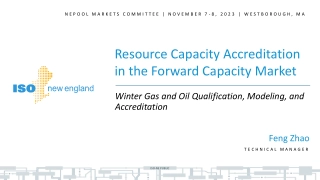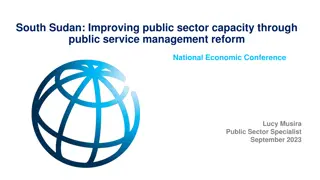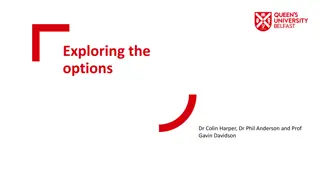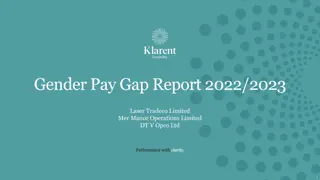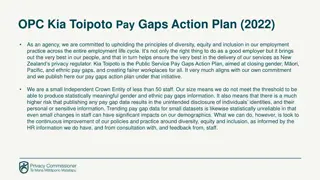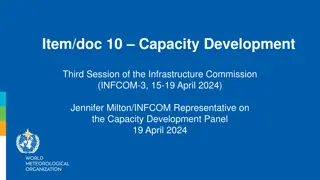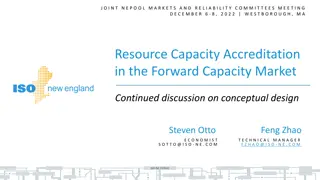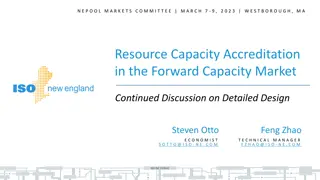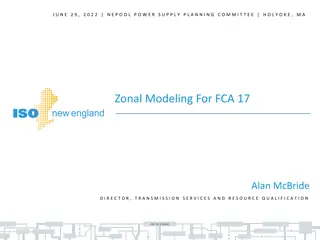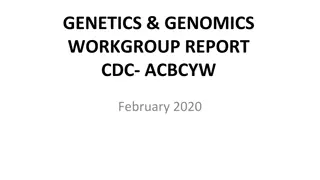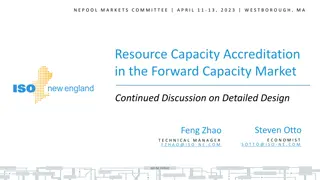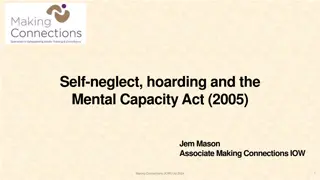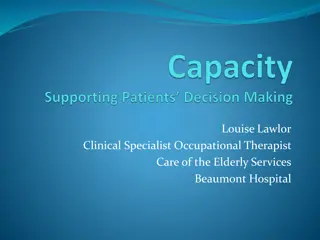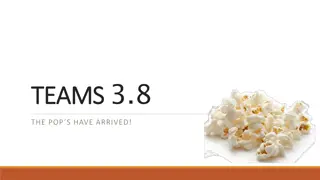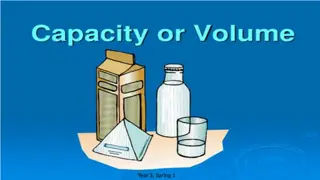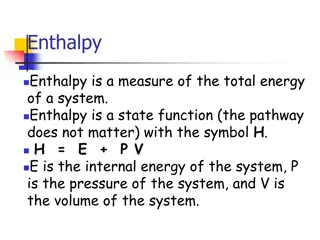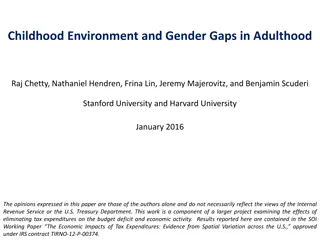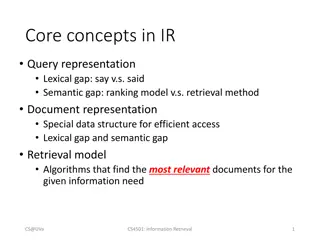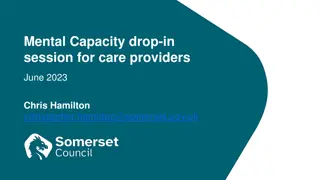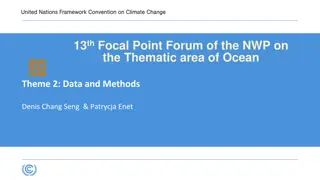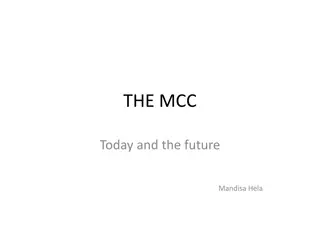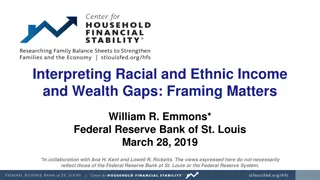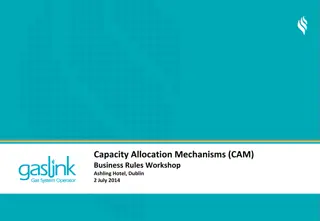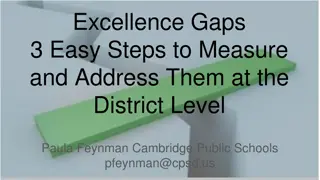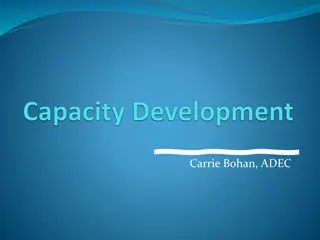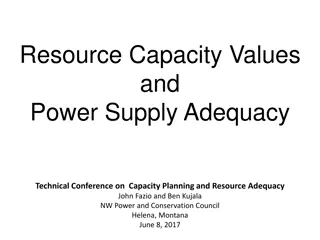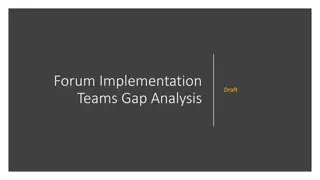Enhancing Public Service Professionalization Through National School of Government Positioning
This presentation outlines the strategic response to public service reform towards professionalization by positioning the National School of Government (NSG) to build state capacity, address deficiencies in various departments, and strengthen governance for effective service delivery in South Africa
0 views • 19 slides
Resource Capacity Accreditation in the Forward Capacity Market
The presentation discusses the Resource Capacity Accreditation (RCA) project in the Forward Capacity Market (FCM) by ISO-NE, aiming to improve accreditation processes to support a clean-energy transition. It emphasizes modeling and accrediting gas and oil resources for resource adequacy as the energ
0 views • 38 slides
Enhancing Public Sector Capacity Through Service Management Reform
South Sudan is working on improving public sector capacity through service management reform, focusing on institutionalizing capacity building, pay and grading, pension support, and strengthening the center of government. Lessons from capacity injection mechanisms and policy frameworks are guiding t
0 views • 16 slides
Global Hydrogen Projects Outlook and Electrolyzer Capacity Analysis
This outlook delves into the IEA Hydrogen Production Projects Database to provide an update on the status of global hydrogen projects. It covers the timing and capacity of new electrolyzer installations, projecting significant growth in electrolyzer capacity by 2030 to meet Net Zero Emissions Scenar
1 views • 16 slides
Exploring Key Distinctions in Legal and Mental Capacity Frameworks
This presentation delves into the crucial distinctions within the legal and mental capacity frameworks, focusing on concepts such as legal personhood, legal capacity, and mental capacity as defined in the MCA (NI) 2016. It explores the implications of these distinctions on decision-making abilities
4 views • 23 slides
Klarent Hospitality Gender Pay Gap Report 2022/2023 Overview
Klarent's Gender Pay Gap Report for 2022/2023 reveals insights into gender disparities in pay at Laser Tradeco Limited and Mer Manor Operations Limited. The report discusses hourly pay gaps, bonus pay gaps, and the distribution of male and female employees across pay quartiles. Despite challenges fa
8 views • 9 slides
OPC Kia Toipoto Pay Gaps Action Plan 2022 Summary
The OPC Kia Toipoto Pay Gaps Action Plan 2022 outlines the agency's commitment to diversity, equity, and inclusion in employment practices. Despite limitations in data due to the small staff size, the agency focuses on continuous improvement in policies informed by HR information and staff feedback.
1 views • 6 slides
INFCOM Capacity Development Initiatives Overview
INFCOM's capacity development initiatives focus on enhancing Earth system observations, closing capacity gaps on weather services, and supporting new opportunities in competencies and capabilities. Collaboration and coordination mechanisms have been established to facilitate sharing of information a
0 views • 11 slides
Understanding Disk Storage Systems in Computer Science
Disk storage systems play a crucial role in computer architecture. This tutorial delves into the differences between disks and main memory in terms of access time, capacity calculations, block sizes, rotational delays, and transfer rates. It covers key concepts such as track capacity, surface capaci
0 views • 23 slides
Joint NEPOOL Markets and Reliability Committees Meeting December 6-8, 2022, Westborough, MA
A meeting discussing Resource Capacity Accreditation in the Forward Capacity Market, focusing on improving accreditation processes to support a reliable transition to clean energy. The presentation outlines the proposed improvements for FCA 19, emphasizing the accreditation of resources based on the
0 views • 81 slides
Resource Capacity Accreditation in Forward Capacity Market Overview
Resource Capacity Accreditation project aims to enhance ISO-NE's accreditation processes in the Forward Capacity Market, supporting a reliable, clean-energy transition. Key concepts covered in this educational presentation include accreditation space, methods, benefits, challenges, and improvement o
1 views • 53 slides
Resource Capacity Accreditation in the Forward Capacity Market Discussion
The presentation discusses improvements in the Resource Capacity Accreditation project of ISO-NE's Forward Capacity Market to support a reliable, clean-energy transition. It includes details on seasonal components, reconfiguration auctions, trading obligations, and stakeholder schedules. Examples pr
3 views • 71 slides
Capacity Zone Modeling for Forward Capacity Auction 17 Results
This presentation unveils the Capacity Zone modeling calculations for Forward Capacity Auction 17 associated with the 2026-2027 Capacity Commitment Period by ISO-NE PUBLIC. It delves into boundary definitions, import-constrained zone modeling, and market rules guiding the assessments and modeling pr
0 views • 16 slides
Understanding Challenges and Gaps in Genetic and Genomic Testing for Breast Cancer Risk
The report highlights current challenges and identified gaps in genetic and genomic testing for breast cancer risk assessment. The workgroup aims to catalog existing materials, address terminology confusion, and improve public and clinician education. Challenges include complex terminology, uncertai
0 views • 21 slides
Proposal for Resource Capacity Accreditation in Forward Capacity Market
The ISO-NE has proposed improvements to the accreditation processes in the Forward Capacity Market (FCM) through the Resource Capacity Accreditation (RCA) project. The aim is to enhance the accreditation of resource contributions to ensure reliability during the transition to a cleaner energy mix. T
0 views • 59 slides
Resource Capacity Accreditation in the Forward Capacity Market: Continued Discussion and Detailed Design
The Resource Capacity Accreditation (RCA) project by ISO-NE aims to enhance accreditation processes in the Forward Capacity Market (FCM) to support a reliable, clean-energy transition. This presentation focuses on seasonal components of Capacity Supply Obligations (CSO), Pay-for-Performance (PFP) ob
0 views • 58 slides
Addressing Education Gaps for Missouri's Workforce Development
This research presentation discusses the current challenges and opportunities in closing education gaps in Missouri, focusing on workforce development needs, collaborations among stakeholders, and initiatives to support students and teachers. Key areas include understanding degree attainment trends,
0 views • 30 slides
GAIA-CLIM Online Catalogue of Gaps: Identification, Assessment, and Impacts
The GAIA-CLIM project focuses on identifying, assessing, and addressing gaps in climate data. Through a collaborative approach involving project members, user workshops, and a living document, the project aims to categorize gap types, interact with gap owners, and formulate SMART actions for remedyi
1 views • 21 slides
Understanding Self-Neglect, Hoarding, and the Mental Capacity Act (2005)
Self-neglect and hoarding are complex issues often intertwined with mental capacity challenges. The Mental Capacity Act (2005) outlines capacity assessments, decision-making criteria, and challenges faced by professionals in safeguarding individuals. Recognizing the need for trauma-informed care in
1 views • 16 slides
Understanding Legal and Mental Capacity in Healthcare Decisions
Clinical specialist occupational therapist, Louise Lawlor, advocates for patients' rights and decision-making capacity in healthcare settings. She emphasizes the importance of legal and mental capacity in making informed decisions, highlighting relevant legislation, guidance documents, and a functio
0 views • 24 slides
Understanding Planned Gaps in TEAMS Version 3.8
TEAMS Version 3.8 introduces the concept of Planned Gaps, allowing participants to prevent automatic exits by entering periods without qualifying services. Learn how to enter and manage Planned Gaps effectively to support continued enrollment in the AEL program. Discover the importance of aligning P
0 views • 33 slides
Exploring Capacity and Volume in Practical Settings
Explore the concepts of volume and capacity through engaging activities involving measuring liquid in containers, understanding units like milliliters and liters, and solving capacity-related questions. Discover how to work out different measurements and practice practical capacity in the kitchen wi
0 views • 7 slides
Understanding Enthalpy and Heat Capacity in Chemistry
Enthalpy is a measure of total energy in a system, represented as H = E + P.V. Heat at constant pressure relates to enthalpy changes. Calorimetry and heat capacity help measure and understand heat in chemical reactions. Specific heat capacity and molar heat capacity play key roles in determining ene
0 views • 16 slides
Workshop on New Approaches to Statistical Capacity Development in Lao PDR
This workshop, hosted by PARIS21 and UNDP, focuses on enhancing statistical capacity development in Lao PDR. It covers topics like successful capacity development programs, partnerships for national statistics development, and prioritizing needs versus international requirements. The Lao Statistics
0 views • 15 slides
Changes in Capacity Allocation Regulations for Gas Infrastructures in Portugal
The new regulation in Portugal brings significant changes in capacity booking and trading to promote convergence with CAM NC and enable a secondary market. Major changes include ex-ante payment of capacity rights, capacity allocation via a booking platform, and enhancement of liquidity in the second
0 views • 13 slides
Impact of Childhood Environment on Gender Gaps in Adulthood
Gender gaps in adulthood, particularly in earnings and employment, have been extensively studied. This paper explores how childhood environment influences these gaps, showing that boys from poor families are less likely to work than girls. The study reveals that gender gaps vary across different are
0 views • 44 slides
The Assisted Decision-Making (Capacity) Act 2015 in the Criminal Justice Context
The Assisted Decision-Making (Capacity) Act 2015 introduces key reforms such as the abolition of wards of court system for adults, a statutory functional test of capacity, new guiding principles, a three-tier framework for support, and tools for advance planning. It emphasizes functional assessment
0 views • 17 slides
Understanding Capacity Challenges in Wills: Legal Insights
Testators must possess mental capacity when making a will, as established in legal cases like Banks v. Goodfellow. The common law test for testamentary capacity remains relevant despite the Mental Capacity Act 2005. The Banks v. Goodfellow test outlines the required mental power for making a valid w
0 views • 18 slides
Understanding Core Concepts in Information Retrieval: Lexical and Semantic Gaps, Retrieval Models, and Algorithms
Explore the core concepts in Information Retrieval (IR) including lexical gaps like 'say' vs. 'said', semantic gaps, ranking models vs. retrieval methods, special data structures for efficient access, and algorithms for finding relevant documents. Understand the differences between IR and databases,
0 views • 46 slides
Somerset Mental Capacity Training Session June 2023
This information outlines a mental capacity drop-in session for care providers in June 2023, hosted by Chris Hamilton from Somerset Council. It covers topics like the aim of the Mental Capacity Act, the Somerset mental capacity competency framework, and the importance of staff training. It emphasize
0 views • 21 slides
Addressing Knowledge Gaps and Needs in Ocean Data and Methods for Climate Change Adaptation
The 13th Focal Point Forum of the NWP focuses on the thematic area of Ocean Theme 2: Data and Methods, highlighting challenges in accessing reliable data for forecasting marine-climate extremes and assessing adaptive capacity. Knowledge gaps exist in essential ocean variables, hindering evidence-bas
0 views • 5 slides
Enhancing Regulatory Oversight in Medicines and Healthcare
The MCC faces challenges in quality reviews, timeliness, transparency, responsiveness, and capacity. Identified gaps include the regulation of complementary medicines, African traditional medicines, medical devices, and more. Efforts to address these gaps involve the establishment of SAHPRA and init
0 views • 18 slides
Understanding Racial and Ethnic Income Disparities
This piece delves into the income and wealth gaps among different racial and ethnic groups, emphasizing the importance of framing when analyzing such disparities. It presents data from the Federal Reserve's Survey of Consumer Finances, highlighting the slower closure of income gaps for Black and His
0 views • 16 slides
Capacity Allocation Mechanisms (CAM) Business Rules Workshop Summary
This summary provides insights into the Capacity Allocation Mechanisms (CAM) Business Rules Workshop held at Ashling Hotel, Dublin on July 2, 2014. The workshop covered topics such as CAM business rules scope, key features, auction processes, code modifications, implementation timelines, and consult
0 views • 32 slides
Addressing Excellence Gaps in Education
Explore a three-step process to measure and address excellence gaps at the district level in education, focusing on defining the excellence gap, inspiring action, and bridging the gap using a Response to Intervention (RtI) model. Learn about the disparity in academic performance between marginalized
0 views • 18 slides
Understanding Capacity Development in Water Systems
Capacity development is crucial for water systems to acquire and maintain technical, managerial, and financial capabilities in order to consistently provide safe drinking water. Federal requirements mandate new public water systems to demonstrate capacity, with states required to have strategies to
0 views • 8 slides
Gender Pay Gap Reporting Analysis
Analysis of gender pay gap reporting data reveals disparities in mean and median hourly remuneration gaps and bonus remuneration gaps between male and female employees. The findings also include insights on pay gaps in part-time and temporary positions, as well as percentages of employees receiving
0 views • 8 slides
Resource Capacity Values and Power Supply Adequacy Conference Highlights
Explore insights from the Resource Capacity Values and Power Supply Adequacy Technical Conference, covering topics like integrated vs. standalone capacity values, utilizing hydro storage to increase capacity, and the 2021-22 Adequacy Summary. Learn about the importance of integrated capacity values
0 views • 9 slides
Enhancing National Education Policies: Bridging Gaps and Recommendations
The presentation focuses on bridging gaps in the National Education Policy 2009 and aligning it with NEP 2015. It highlights key policy actions, gaps in implementation, and recommendations to improve literacy rates, develop curriculums, mainstream non-formal education, and allocate budgets effective
0 views • 14 slides
Draft - Early Thinking on Gaps in Food Insecurity Implementation
The draft outlines early thinking on gaps in food insecurity implementation, focusing on expand produce purchasing initiatives and prioritize Washington-grown products. Recommendations include actions to increase purchasing power at the county level and boost participation in nutrition programs. Fun
1 views • 34 slides

